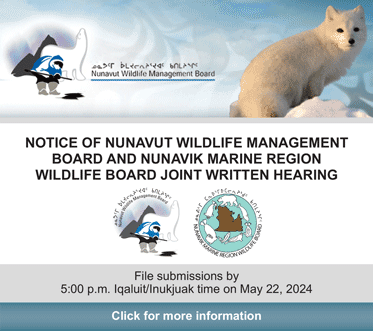PM Trudeau proposes sweeping new Indigenous rights plan
“We need a government-wide shift in how we do things”

Prime Minister Justin Trudeau, speaking in the House of Commons Feb. 14, lays out his proposal for a new way of recognizing and implementing Inuit, Métis and First Nations rights. “Let us do what the Constitution Act, 1982, has required us to do for almost 40 years,” he said. (SCREEN CAPTURE)

Romeo Saganash, the NDP MP who represents Nunavik, seen here while speaking in Iqaluit in 2015, said yesterday he remains skeptical that the Liberal government will keep the promises that Prime Minister Justin Trudeau made yesterday. “One of the most unacceptable things politicians can do is to quash the hope of the most vulnerable in our society by breaking yet another promise. That cannot happen,” Saganash said. (FILE PHOTO)
Declaring that Canada has a responsibility “to do better, to be better,” Prime Minister Justin Trudeau said in the House of Commons yesterday that his government will create a big new plan, prior to the next federal election in October 2019, to fully recognize and implement Indigenous rights.
To that end, his government, in partnership with Inuit, Métis and First Nations, will start work this year on a project that will lead to what the government calls a “Recognition and Implementation of Rights Framework.”
“We need a government-wide shift in how we do things,” Trudeau said.
To get there, the government will consult Indigenous peoples, territories, provinces, and municipalities, plus non-Indigenous civil society, academia and business in a series of “national engagement activities,” Trudeau said.
Carolyn Bennett, the minister of Crown-Indigenous relations and northern affairs, will lead that effort, which would see a framework introduced later this year for implementation before October 2019.
At the same time, Jody Wilson-Raybould, the federal justice minister, will work with Aboriginal law and Indigenous governance experts.
And the project will, as a starting point, include legislative and policy changes, and new ways of resolving disputes that will reduce the use of the courts.
Trudeau said the heart of the exercise is to finally provide a clear definition of what rights are contained in Section 35 of the Constitution Act, but it won’t require any constitutional change.
“Let us do what the Constitution Act,1982, has required us to do for almost 40 years,” he said.
Section 35 states that existing aboriginal and treaty rights are recognized and affirmed.
Those rights were not listed in the first version of the constitutional reform package that Justin Trudeau’s father, the late former prime minister Pierre Trudeau, proposed in 1980 and were not included in the Constitution Act until late 1981, after a vigorous political campaign led by Indigenous people.
“The government of the day, led by my father, did not intend to include these rights at the outset. It was the outspoken advocacy of First Nations, Inuit and Métis peoples, supported by non-indigenous Canadians, that forced that government to reconsider,” Trudeau said.
But since then, Indigenous peoples have been forced to go to court many times to assert Section 35 rights that already should have been acknowledged, Trudeau said.
“The work to give life to Section 35 was supposed to be done together with First Nations, Inuit, and Métis peoples, and while there has been some success, progress has not been sustained nor significant,” he said.
To fix that, Trudeau said the government will replace instruments like its policies on comprehensive land claims and the inherent right to self-government “with new and better approaches that respect the distinctions between First Nations, Inuit and Métis peoples.”
That, in turn, will create more confidence and certainty in the future, he said.
It would also lead to increased prosperity for Indigenous peoples and bring an end to poverty, overcrowded housing, inadequate education and other social ills, he said.
And following the outrage that greeted the not-guilty verdict delivered by an all-white jury in the recently concluded second-degree murder trial of Saskatchewan farmer Gerald Stanley, who was accused in the shooting death of Coulten Boushie, a young Indigenous man, Trudeau promised “concrete reforms to the criminal justice system” including changes in how juries are chosen.
Romeo Saganash, the NDP member for Abitibi-Baie-James-Nunavik-Eeyou and his party’s critic for reconciliation, spoke in Cree at the beginning of his response to Trudeau’s statement, thanking him for his words.
But Saganash said he remains skeptical about whether Trudeau’s government will keep its promises.
He pointed to election campaign promises the Liberal government has dragged its heels on, such as proper funding for First Nations child welfare programs and said the denial of Indigenous rights continues under Trudeau’s government.
“One of the most unacceptable things politicians can do is to quash the hope of the most vulnerable in our society by breaking yet another promise. That cannot happen. I will not let that happen again,” Saganash said.
Saganash proposed his own list of measures that he said should be included in Trudeau’s framework, including the adoption of international human rights standards, a repudiation of the doctrine of superiority, Indigenous language promotion, and that “the free, prior, and informed consent concept needs to be acknowledged, endorsed, and embraced in our country.”
Saganash is the sponsor of Bill C-262, a private member’s bill that would require all federal laws to be brought into line with the United Nations Declaration on the Rights of Indigenous Peoples. That proposed new law received second reading recently, with Liberal support, and now sits before the Commons Indigenous affairs committee.
Cathy McLeod, the Conservative shadow minister for Indigenous and northern affairs, also pointed to the Liberal government’s record of broken promises.
“If I were to point to any concern with the prime minister’s promises, it is that the government has too often fallen short of them, even in its brief time in office,” McLeod said.
On the other hand, Natan Obed, the president of Inuit Tapiriit Kanatami, said he welcomes Trudeau’s commitments, and said a particular problem for Inuit is the recognition of rights that are already set out in land claims agreements.
“The process of reconciling our past with our future means imagining a new relationship based on respect for Inuit as rights-holders—not as stakeholders—and respect for Inuit Nunangat as our homeland,” Obed said in a statement.





(0) Comments